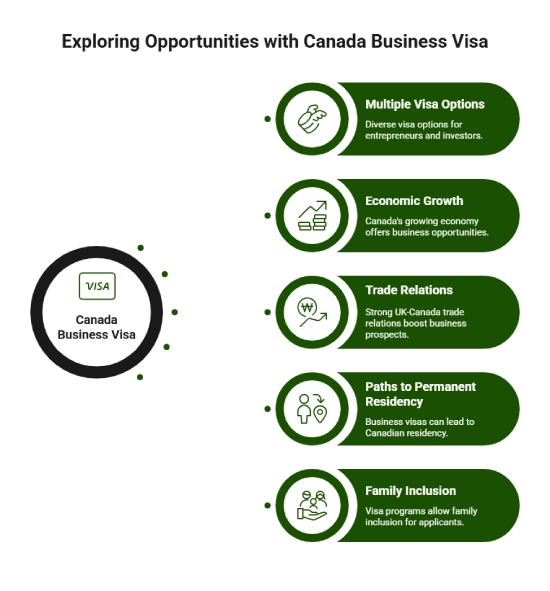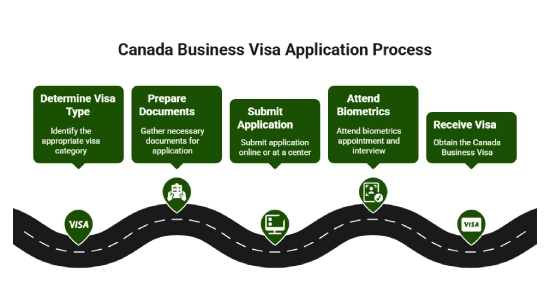Canada Business Visa – Guide for UK Applicants
Are you thinking about growing your business in Canada? The Canada Business Visa gives UK entrepreneurs, investors, and professionals a way into a strong economy. Given the good business environment and strong trade ties between the UK and Canada, now is a good time to consider Canadian projects.
- Multiple Visa Options: There are different options for entrepreneurs, investors, and those visiting for business.
- Economic Growth: Canada's economy is expected to grow, giving many business opportunities.
- Trade Relations: The UK and Canada trade a lot with trade worth over £20 billion each year.
- Paths to Permanent Residency: Some business visas can lead to Canadian permanent residency.
- Family Inclusion: Most business visa programs let applicants bring their close family.

*Want guidance to apply for Canada Business Visa? Sign up with Y-Axis for comprehensive support with the process.
What is the Canada Business Visa?
A Canada Business Visa allows people from other countries to enter Canada for short-term business activities, provided the activities do not involve working in Canada. This visa serves those seeking to investigate business prospects, make investments, or keep up business contacts in Canada. Those seeking employment with a Canadian company or intending to join the Canadian workforce should not apply for this visa.
Benefits of the Canada Business Visa
The benefits of the Canada Business Visa are given below.
- Canada has a stable economy, with a GDP expected to grow by 3.2% in 2026.
- The Start-Up Visa and C11 Work Permit programs can lead to Canada PR or permanent residency.
- Applicants can usually include their spouses and dependent children in their applications.
- Canada's location gives access to markets in North America.
- Canada has business incentives and support for new businesses.
Types of Canada Business Visas
The various types of Canada Business visas are given below.
- Start-Up Visa Program
- Self-Employed Persons Program
- Owner-Operator LMIA Route
- C11 Entrepreneur Work Permit
- Business Visitor Visa (Temporary)
%20(1).webp)
Start-Up Visa Program
This federal program is designed for entrepreneurs with innovative business ideas that can create jobs and compete on a global scale. To qualify, applicants must secure support from a designated organization, meet language requirements, and show proof of settlement funds. Successful applicants can apply directly for permanent residence and may also receive an open work permit while their application is processed.
Provincial Nominee Programs (Entrepreneur and Investor Streams)
Each province and territory (except Quebec) runs its own business immigration streams under the Provincial Nominee Program. These streams typically require applicants to establish or invest in a business, operate it under a work permit, and then transition to permanent residence once program conditions are met. Requirements vary by province, but usually include minimum investment amounts, net worth thresholds, and relevant business experience.
Business Visitor Visa (Temporary Resident Visa)
This visa allows foreign nationals to visit Canada for short-term business activities such as attending meetings, conferences, or trade shows. It does not allow holders to engage in direct employment in Canada or to sell goods and services to the general public. Stays are usually up to six months.
Open Work Permit for Start-Up Visa Applicants
Entrepreneurs applying through the Start-Up Visa Program may be eligible for an open work permit valid for up to three years. This allows them to live in Canada and actively develop their business while their permanent residence application is being processed.
Self-Employed Persons Program
This permanent residence program is for individuals with relevant experience in cultural activities or athletics who can make a significant contribution to Canada’s cultural or athletic life. Intake for this program is currently paused until January 2027.
C11 Entrepreneur / Self-Employed Work Permit
Under the International Mobility Program, the C11 work permit allows entrepreneurs or self-employed individuals to temporarily establish or manage their own business in Canada if it will bring significant economic, social, or cultural benefits. Although temporary, it often serves as a stepping-stone to permanent residence through other immigration programs.
Eligibility Criteria for Canada Business Visa
The eligibility criteria for UK applicants are given below.
- Valid passport and correct entry document
- Clear purpose and program fit
- Sufficient funds
- Admissibility requirements
- Complete and accurate application with fee payment
- Intent to leave at the end of authorized stay (for temporary visitors
Canada Business Visa (Program-wise eligibility breakdown)
| Pathway | Who it’s for | Key eligibility | Funds | Language |
| Business Visitor (TRV/eTA) | Short trips for meetings, negotiations, site visits, events | Activities tied to employment outside Canada; permitted without a work permit; must meet entry requirements by nationality | Show enough money for the trip and return | Not certain officer assesses overall purpose |
| Start-Up Visa (Permanent Residence) | Founders building an innovative business in Canada | Letter of support from a designated organization (VC/angel/incubator); qualifying business ownership (each applicant ≥10% and applicants + designated org >50%); intend to live outside Quebec; active, ongoing management in Canada and essential operations in Canada | Settlement funds by family size | CLB 5 (English/French) |
| PNP — Entrepreneur/Investor (Permanent Residence) | Entrepreneurs establishing/operating a business in a province/territory | Provincial nomination first; province-set investment, net-worth, business plan, management/experience criteria; federal admissibility and final PR decision | Province-specific (plus federal PR fees) | Province may set minimums; federal rules apply |
| Work-Permit Routes (e.g., Intra-Company Transferee, certain free-trade categories) | Temporary hands-on work in Canada tied to a foreign employer or qualifying role | Meet the specific work-permit category criteria; many are LMIA-exempt under the International Mobility Program; employer compliance rules apply | Show ability to support stay (and meet any employer/program financial conditions) | Varies by category |
Document Requirements
The documents required to apply for the Canada Business visa are given below.
- Passport: The passport should be valid for your entire stay.
- Business Plan: A plan that details your goals, market research, and financial forecasts.
- Proof of Funds: Bank records that show you have enough money.
- Letters of Support: If needed, get these from organizations or business partners.
- Credentials: Provide your certificates.
- Police Clearance: You may need to provide this from countries you've lived in for over six months.
- Medical Exam: This might be needed based on the program.
Canada Business Visa Application Process
To apply for the Canada Business Visa, you must follow the steps given below.
Step 1. Choose your pathway.
Business Visitor (TRV/eTA), Start-Up Visa (permanent residence), PNP entrepreneur (provincial nomination → PR), or a work-permit category for hands-on work.
Step 2. Gather documents.
Passport and proof of business purpose; plus program-specific proofs (e.g., Start-Up Visa letter of support, language results and settlement funds; PNP nomination and business plan; work-permit category evidence).
Step 3. Apply for the visa
Submit the correct online application (PNP applicants apply to the province first, then to federal PR) and pay the required fees.
Step 4. Complete checks.
Provide biometrics and an immigration medical exam if requested; upload any additional documents promptly.
Step 5. Decision & next steps.
For visitors, enter and comply with the authorized stay; for PR/work-permit approvals, follow landing or permit instructions exactly.

Canada Business Visa Application Fees
Detailed information about the application cost of Canada Business Visa is given below.
| Canada Business visa type | Principal applicant fee (CAD) |
| Start-Up Visa Program (Permanent Residence) | 2,385 |
| Provincial Nominee Programs – Entrepreneur/Investor (federal PR fees) | 1,525 |
| Business Visitor Visa (Temporary Resident Visa – TRV) | 100 (per person) |
| Open Work Permit for Start-Up Visa Applicants | 255 |
| Self-Employed Persons Program (Permanent Residence) | 2,385 |
| C11 Entrepreneur / Self-Employed Work Permit (IMP R205(a)) | 155 |
Canada Business Visa Processing Time
Detailed information about the Canada Business Visa Processing time is given below.
|
Visa Type |
Estimated Processing Time |
|
Start-Up Visa Program |
12 to 16 months |
|
Self-Employed Persons Program |
24 to 36 months |
|
Owner-Operator LMIA Route |
4 to 6 months |
|
C11 Entrepreneur Work Permit |
3 to 6 months |
|
Business Visitor Visa (Temporary) |
2 to 8 weeks |
Can You Include Family Members?
Yes, most Canada business visa programs let applicants include their immediate family. This implies:
- Spouse or common-law partner: They can apply for an open work permit.
- Dependent children: They can apply for study permits to go to Canadian schools.
- Each family member has to meet all entry requirements.
Pathway to Permanent Residency
Business visas offer different ways to get Canadian permanent residency:
- Start-Up Visa: You get permanent resident status once approved.
- C11 Entrepreneur Work Permit: A temporary permit that can lead to permanent residency via programs like the Provincial Nominee Program (PNP) or Express Entry.
- Owner-Operator LMIA: Work experience can help you qualify for permanent residency programs.
Extension, Renewal, or Switching Visas
- Temporary visas can be extended if the requirements are still met.
- People can renew their status if they continue to follow visa rules.
- Changing from one visa type to another might be an option, depending on the situation and requirements.
Settlement & Post-Arrival Essentials for Business Immigrants
- Set up a business bank account — Manage your finances and access newcomer banking packages that often include low fees and tailored business services.
- Register your company in Canada — Incorporate your business at the federal or provincial level, obtain a business number, and apply for any required permits or licenses.
- Explore pathways from temporary status to permanent residence — If you enter Canada on a work permit or business visitor visa, you may later transition to permanent residency through programs such as the Start-Up Visa or Provincial Nominee Programs.
How Can Y-Axis Help You?
Y-Axis offers advice on immigration and visas, with specific skills in helping business people from the UK with the Canadian Business Visa. We give specific advice to make sure your application goes smoothly and you can move to Canada without problems.
Our services include:
- Individual meetings to find the right Canada Business Visa for you.
- Help getting ready and checking all the papers you will need.
- Advice on writing a complete business plan that follows all rules.
- Help with biometrics, submitting your application, and dealing with Immigration, Refugees and Citizenship Canada (IRCC).
- Help after approval to set up your business and move your family to Canada.
Looking for Inspiration
Explore what Global Citizens have to say about Y-Axis in shaping their future
Frequently Asked Questions
